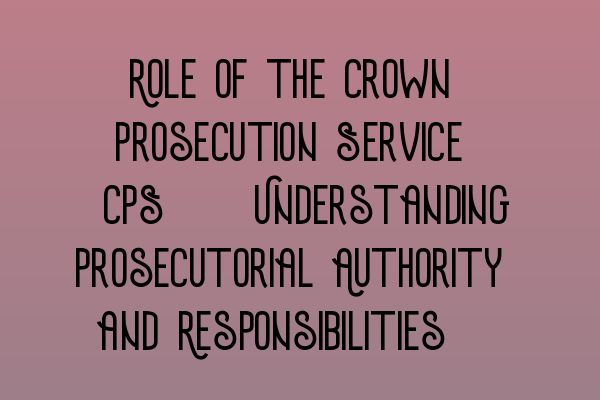Role of the Crown Prosecution Service (CPS): Understanding Prosecutorial Authority and Responsibilities
The Crown Prosecution Service (CPS) plays a critical role in the criminal justice system of the United Kingdom. As a solicitor dealing with criminal law, it’s essential to understand the authority and responsibilities of the CPS. In this article, we will delve into the key aspects of the CPS’s role and shed light on its functions in prosecuting criminal cases.
What is the Crown Prosecution Service (CPS)?
The Crown Prosecution Service is an independent body responsible for prosecuting criminal cases in England and Wales. It was established under the Prosecution of Offences Act 1985 and has since become the primary prosecuting agency in the country. The CPS operates under the guidance and supervision of the Director of Public Prosecutions (DPP).
The primary function of the CPS is to make fair and impartial decisions on whether to prosecute people accused of committing criminal offenses. Their decisions are guided by the Code for Crown Prosecutors, which sets out the legal test for prosecution and provides guidance on the factors to consider when determining if a case should proceed to court.
Prosecutorial Authority and Responsibilities
As the principal prosecuting authority in England and Wales, the CPS has several important responsibilities. These include:
- Evidential Test: The CPS must assess whether there is sufficient evidence to provide a realistic prospect of conviction. They carefully review the evidence gathered by the police and any additional material that may have a bearing on the case.
- Public Interest Test: Even if there is sufficient evidence, the CPS must consider whether it is in the public interest to prosecute. Factors such as the seriousness of the offense, the impact on the victim, and the defendant’s culpability are taken into account.
- Legal Expertise: The CPS employs highly skilled and experienced lawyers who specialize in criminal law. They provide legal advice to the police during the investigation stage and conduct prosecutions in the Magistrates’ Court, Crown Court, and Higher Courts.
- Case Preparation: The CPS ensures that cases are thoroughly prepared for court. This includes reviewing evidence, instructing expert witnesses, anticipating and countering defense arguments, and advising the police on further investigations if necessary.
- Advocacy: CPS prosecutors present cases in court and represent the interests of the public. They present evidence, cross-examine witnesses, make legal submissions, and seek appropriate sentences for convicted individuals.
- Appellate Function: The CPS deals with appeals against convictions and sentences, both as prosecutors and respondents.
Working with the Crown Prosecution Service
For solicitors practicing criminal law, understanding the CPS’s role is essential for effective case management. Collaborating with the CPS can help ensure that the interests of the accused, the victim, and the public are adequately represented.
It is crucial to maintain open lines of communication with CPS prosecutors, particularly during the early stages of a case. Sharing information and providing a clear overview of the evidence can help facilitate the decision-making process and lead to fair and efficient outcomes.
As legal professionals, we must also keep pace with changes in legislation and developments in criminal law. Staying updated on new guidelines, precedents, and legal interpretations enhances our ability to effectively navigate the legal system and advocate for our clients.
Conclusion
The Crown Prosecution Service (CPS) holds a crucial role in the criminal justice system of England and Wales. Understanding the authority and responsibilities of the CPS is essential for solicitors dealing with criminal law cases. By working collaboratively with the CPS, solicitors can ensure fair and just outcomes for their clients.
